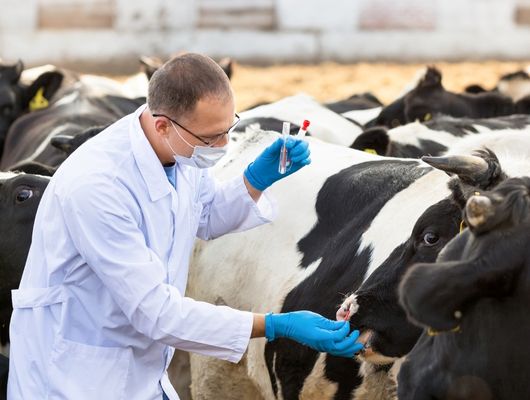Farm animals have an important role to play in the vast landscape of agricultural research because they provide primary sources of food. The symbiotic nature of the human-animal relationship in agriculture helped refine the understanding of livestock health and reproduction.
Scientific exploration and experiments will help identify viable solutions for our planet’s agricultural needs. Experiments with farm animals are important because they are an integral part of agricultural innovation. Successful livestock experimentation improves the overall efficiency and sustainability of the agriculture industry.
Health Improvement
One of the main reasons for farm animal experimentation is to improve livestock health and resiliency and to protect future generations. Disease prevention in livestock reduces economic losses and ensures a safe food supply for consumers. Scientists and farmers can develop new vaccines and treatments by studying diseases in farm animals, ultimately enhancing animal welfare and public health.
Genetic Enhancement
Experiments with farm animals allow genetic enhancements, breeding animals that grow faster, produce more meat, milk, or eggs, and are more resilient to disease. This increased productivity is essential to meet the growing global demand for food, which keeps consistently rising with time. Every step of this process demands thorough research to prevent future issues and keep the animals healthy and safe.
Nutrition Research
Nutrition research is another key area where farm animal experiments are vital. By understanding animals’ dietary needs, we can optimize their feed for growth, health, and production efficiency. The advantages of portable livestock scales come to the fore here, allowing for accurate measurements of an animal’s weight gain and correlating it with the nutritional content of their feed.
Human Medicine
The tie between farm animal experiments and human medicine involves interrelated advancement and discovery for accurate scientific development. With their physiological similarities to humans, animals like pigs and sheep offer invaluable insights for medical research. Pigs share a high degree of cardiovascular and respiratory system similarities with humans, making them ideal subjects in the research of cardiovascular diseases.
Environmental Impact
Experiments with farm animals are important because they can help reduce agriculture’s environmental impact. A significant component of this impact comes from the livestock sector, which contributes to greenhouse gas emissions, deforestation, and water pollution. Scientific experiments with farm animals can mitigate some of these environmental challenges. This can reduce the area of land needed for feed cultivation, decreasing deforestation and habitat destruction.
Experiments with farm animals play a crucial role in modern agriculture and social development. These scientific explorations contribute significantly to collective knowledge, underpinning advancements that are paramount to meeting the mounting challenges of the 21st century.
The role of experimentation in improving animal and human health is essential. The understanding gained from these studies helps the development of new vaccines and treatments for livestock and enhances breeding techniques for higher production and resilience.








